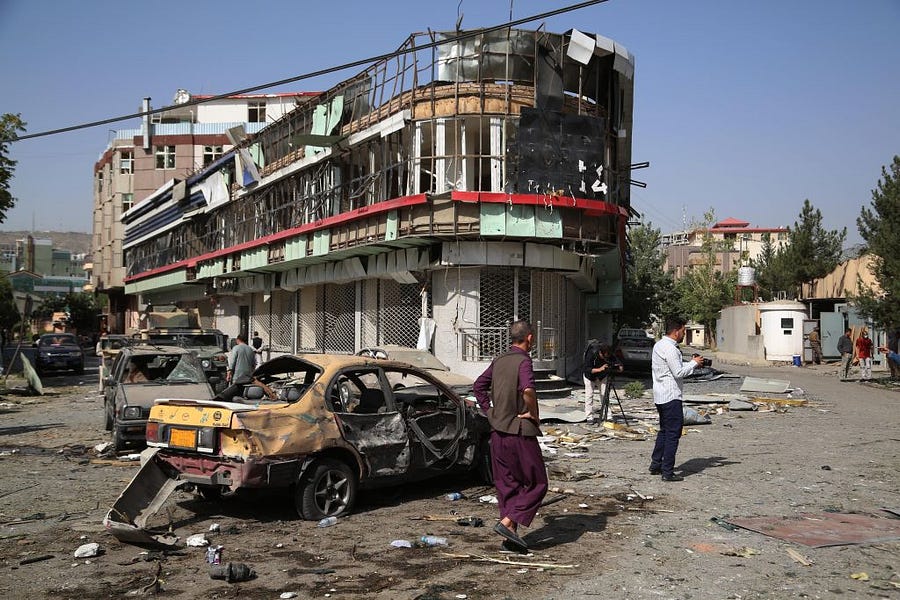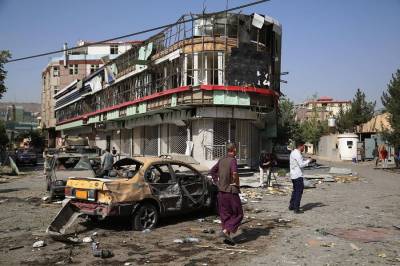As the Taliban and its al-Qaeda allies wage jihad to conquer Afghanistan, the Biden administration clings to the fanciful idea that a negotiated settlement to the war is possible. On Tuesday, State Department spokesperson Ned Price produced a short summary of Secretary of State Anthony Blinken’s most recent conversation with Afghan President Ashraf Ghani.
As Ghani’s forces fight for their lives, this is what the U.S. government decided to say:
The Secretary and President Ghani emphasized the need to accelerate peace negotiations and achieve a political settlement that is inclusive, respects the rights of all Afghans, including women and minorities, allows the Afghan people to have a say in choosing their leaders, and prevents Afghan soil from being used to threaten the United States and its allies and partners.
In reality, there are no “peace negotiations.” The Taliban has no interest in a “political settlement,” other than one in which Kabul surrenders and the jihadists’ totalitarian Islamic emirate is resurrected. The Taliban certainly isn’t going to respect “the rights of all Afghans, including women and minorities.” There is nothing in the group’s history or current behavior to indicate that is even remotely possible. Instead, the Taliban is waging a violent campaign against Afghanistan’s civil society, attempting to roll back the “rights” ordinary Afghans have enjoyed since the end of the Taliban’s authoritarian rule in late 2001. Nor is the Taliban going to allow the “Afghan people to have a say in choosing their leaders.” The jihadists reject any form of democracy, because it is anathema to them. And the Taliban remains closely allied with al-Qaeda, which continues to threaten the U.S.
Price’s summary did condemn “the ongoing Taliban attacks, which show little regard for human life and human rights,” noting that the group’s offensive had led to “the loss of innocent Afghan lives and displacement of the civilian population.” And, as reported by CNN, Price did acknowledge that the Taliban’s behavior is at odds with the idea that a settlement is in the cards. But Price also said this:
“It is self-evident that the Taliban seek a durable solution. It is not in their interest to attempt to wrest power by force and only to be displaced down the road after some period of conflict.”
Self-evident?
Delusional is more like it.
Here are some basic facts about the current state of the war.
The U.S. and Afghan government have repeatedly begged the Taliban for a ceasefire. The State Department’s hashtag campaign—#CeasefireNow—is part of a desperate attempt to persuade the Taliban to halt its violence. Unsurprisingly, it hasn’t worked. The Taliban has never agreed to a meaningful ceasefire. This fact, alone, should give pause to anyone holding out for a broader political settlement.
Around May 1, the Taliban launched a massive offensive throughout the country. The insurgents seized about half of Afghanistan’s territory. This is mostly rural, sparsely-populated terrain. But the insurgents’ objective was to surround a number of provincial capitals and capture some other strategic points, including several lucrative border crossings. They then began laying siege to a number of more densely populated provincial capitals.
Zaranj, the small capital of the remote Nimruz province, which sits on the Iranian border, has just fallen to the insurgents. Zaranj is the first provincial capital seized by the Taliban since the current offensive began. It likely won’t be the last. While Afghan security forces—buttressed by unannounced American airstrikes—have prevented any larger provincial capitals from falling, the cracks in Kabul’s defense are noticeable. The Afghan government is relying heavily on special forces to contain the jihadists’ advances, but those commandos are stretched thin.
Defying America’s hashtag and in-person diplomacy, the Taliban’s jihad has taken a heavy toll since the beginning of the year. The United Nations Assistance Mission in Afghanistan (UNAMA) documented 5,183 civilian casualties (1,659 killed and 3,524 injured) during the first six months of 2021. This is a 47 percent increase over the same timeframe for 2020. According to UNAMA, the main culprit has been the Taliban, which has caused approximately 39 percent of the civilian casualties. Other anti-government actors have tried to take advantage of the chaos as well. In sum, actions taken by the Taliban and other anti-government “elements” have accounted for 64 percent of the civilian casualties.
According to UNAMA, the Afghan government has unintentionally killed and wounded innocents, too, causing 23 percent of the civilian casualties. But the government’s actions are part of a desperate attempt to stymie the advancing jihadis. If it were up to Kabul, the two sides would be engaged in meaningful talks under a ceasefire. The Taliban isn’t having it.
Targeted killings are among the three deadliest tactics documented by UNAMA. The Taliban and other jihadists have been hollowing Afghanistan’s civil society, deliberately assassinating human rights activists, civilian and humanitarian workers, tribal elders opposed to the jihadi project, as well as media personalities and employees. Of course, none of this is consistent with Price’s claim that the Taliban’s interest in a “durable solution” is “self-evident.” The Taliban isn’t preparing for a diplomatic reckoning with the people who support the Afghan government. It is attempting to conquer them.
Just this week, the Taliban’s campaign of targeted killings expanded into the Afghan capital of Kabul. The acting defense minister, Bismillah Mohammadi, narrowly escaped a suicide assault mission by one of the Taliban’s “martyrdom” units on the evening of August 3. Dawa Khan Menapal, the director of the Afghan government’s information and media center, wasn’t so lucky. The Taliban gunned him down in a car traveling through Kabul earlier this morning. Menapal wasn’t a military man—he was a media spokesman whose main task in recent months has been to combat the Taliban’s propaganda.
The Taliban has made it clear that it will continue to hunt down Afghan officials in the weeks and months to come. This is yet another indication, as if it were needed, that the group isn’t preparing for a negotiated settlement with Afghan officials. It is actively trying to kill them.
President Ashraf Ghani and the members of his government cannot afford to entertain America’s servile diplomacy with the Taliban. Nearly all American and NATO forces have been withdrawn. The Afghans must now lead the fight against the jihadis. If they fail, subjugation awaits.
American diplomats and military leaders alike are fond of saying there is no “military solution” for the war in Afghanistan. That’s because the U.S. gave up on any possibility of victory years ago.
The same cannot be said for the Taliban.






Please note that we at The Dispatch hold ourselves, our work, and our commenters to a higher standard than other places on the internet. We welcome comments that foster genuine debate or discussion—including comments critical of us or our work—but responses that include ad hominem attacks on fellow Dispatch members or are intended to stoke fear and anger may be moderated.
With your membership, you only have the ability to comment on The Morning Dispatch articles. Consider upgrading to join the conversation everywhere.